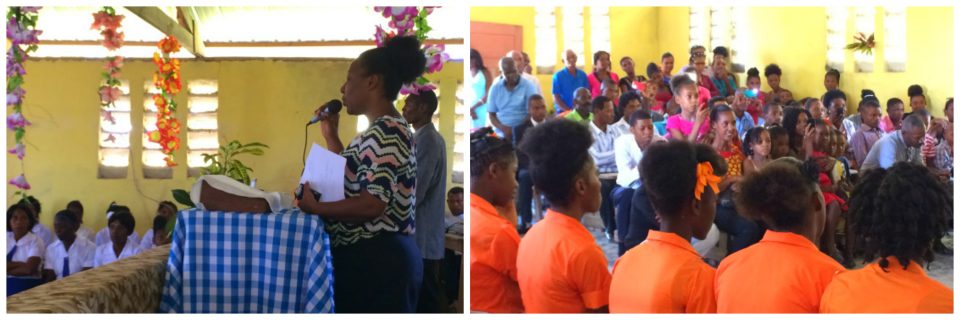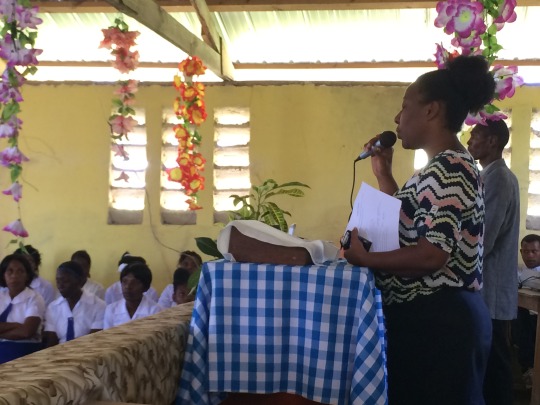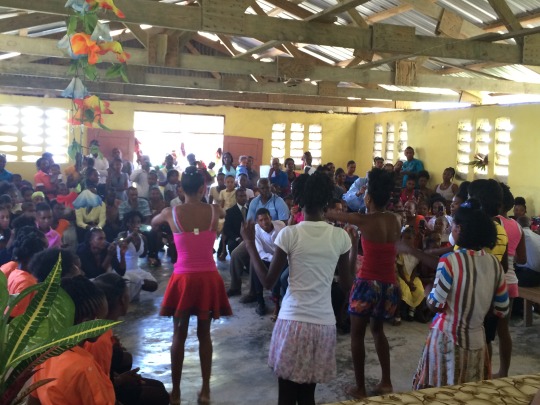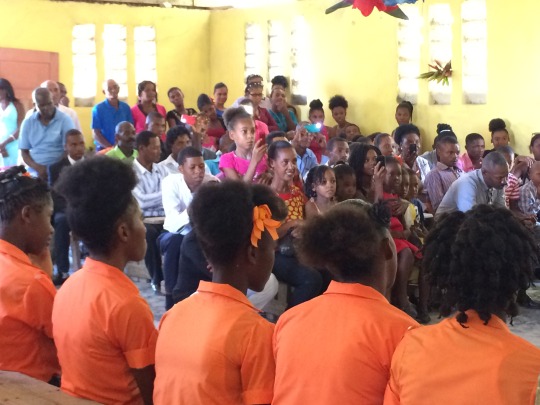Building Capacity: Changing Lives

Mother’s Club: Graduation Day
I was just starting to zone out, as often happens after long periods in which native Haitians are speaking. My brain can only attempt to comprehend a foreign language spoken quickly for so long before it quietly shuts down. Ms. Lourdes was standing at the podium talking, and I was sitting on the corner of the stage catching a much-needed breeze that entered through a small hole in the concrete structure. But I was quickly brought back to reality when I heard my name, “Brittany Jonap.” I looked up and Ms. Lourdes was standing at the podium with the microphone outstretched towards me.
“Oh no,” I thought.
I quickly turned to Ms. Johanne, another CMMB member of staff, for validation, hoping with all my might that she wasn’t asking me to speak. But Ms. Johanne pointed me toward the microphone. Usually I have no problem public speaking, but this was not one of those times. I hesitantly walked to the microphone, trying to figure out what I wanted to say and how to say it, all the time the crowd was clapping and my face turning increasingly red.
I smiled at Ms. Lourdes, took the microphone. I didn’t look up at the audience. “Bonjou. M’ kontan pou tout mere.” That was it. It was all of the Kreyol/French I could find. There was a subtle laughter from the crowd, which is a normal reaction whenever I speak in the local language. I handed the microphone back to Ms. Lourdes and quickly returned to my chair to enjoy the rest of the ceremony.

Ms. Lourdes welcomes all the guests to the Mother’s Club graduation.
I was at the Mother’s Club graduation, where 30 hard-working women received their certificates of completion. It was a three-hour long ceremony filled with dancing, singing, speeches, laughter and love.
The Mother’s Club is an important intervention tool here in Côtes-de-Fer, Haiti. Community healthcare workers identify the most vulnerable families and invite mothers to join a 16-week course dedicated to helping women develop knowledge, skills and tools to better meet the challenges of life. Over the 16-weeks, they learn how to improve their own personal health, as well as the health of the children and families. From learning the importance of breast feeding and nutrition, to hygiene and healthcare, the woman practice question and answer drills and sing songs to help them remember key lessons. Perhaps one of the most important aspects of the course is that the women develop relationships and form support groups with their peers – groups that continue to meet and take care of each other long after the course ends.
The graduation is a joyful mix of ceremony and talent show, as the women share what they’ve learned with their friends and family who cheer enthusiastically from their seats.
A highlight of the ceremony was watching the skits they perform. These skits highlight the important things they learned in the Mother’s Club sessions. On this particular day, wearing costumes and using props, the women performed skits on HIV, malaria, family planning and nutrition. It was clear that the graduates felt empowered – they were confident and informed on these critical health issues.
While they may not have known it as they cheered from their seats, the family and friends of these graduates would be the beneficiaries of all that the women had learned. Educating and empowering women has an impact that goes well beyond the individual – in the words of Brigham Young (1801-1877):
“You educate a man; you educate a man. You educate a woman; you educate a generation.”

The graduates perform a skit to demonstrate what they’ve learned to their families and friends.
The thing that stood out most for me at the ceremony was the amount of pride in the room – especially from the family members. High atop a mountain, on the edge of Côtes-de-Fer, Haiti there was standing room only in the little concrete church. The woman of the Mother’s Club, adorned in their matching uniforms, were accompanied by family and friends – men in suits, young boys in shirts and ties, and young girls in white fluffy dresses. The families clapped and the cheered and took photos as the mothers were handed their Mother’s Club certificates. After the procession each family presented the graduate with a congratulatory gift.

The room was filled with proud members of the graduates families.
The ceremony ended with a song by the graduates, in which they thanked CMMB for giving them the tools to improve their own lives.
“The greatest good you can do for another is not just share your riches, but to reveal to him his own.” – Benjamin Disraeli
The impact of the Mother’s Club and the integration of CMMB in this community is undeniable.
If you are interested in supporting programs like the Mother’s Club, click here.
The text has been translated into Haitian Kreyòl/Creole, one of the main languages spoken in Haiti.
Mwen te fèk kòmanse ap panse yon lòt bagay, jan mwen souvan fè apre peryòd tan nan ki Ayisyen ap pale. M’ ka sèlman eseye konprann pou lontan. Ms. Lourdes t’ ap kanpe pale nan etap epi mwen t’ ap chita sou kwen an nan etap nan. M’ te kapab santi van an nan yon ti twou nan bilding konkrè. M’ te tande non mwen. Mwen te gade leve e Ms Lourdes te kanpe sou etap la ap pwen mikwofòn a mwen. “Pa bon,” mwen te panse. Mwen vit tounen jwenn Ms Johanne wè kisa li te panse. Men, Madam Johanne pwente m’ sou mikwofòn la. Anjeneral mwen pa gen okenn pwoblèm pale an piblik. Men, se te diferan. Mwen te mache nan mikwofòn la. Mwen te pran mikwofòn la. Mwen pa t’ gade nan foul moun yo. “Bonjou. M’ kontan pou tout mere.” Sa a te li. Li te tout nan Kreyol/Franse mwen te kapab panse. Te gen yon ti kras ri nan foul moun la, ki se yon bagay nòmal lè m’ pale. M’ te bay Ms Lourdes mikwofon an e chita pou gade rès la nan seremoni an.
Te gen anpil etone epi ankouraje moman jou sa a. Mwen te a gradyasyon Club des Mères, kote 30 fanm ki travay di resevwa sètifika fini. Se te yon twa-èdtan long seremoni ki te ranpli avèk danse, chante, diskou, ri ak renmen. Yon bon pati nan seremoni an te ap gade sketch yo – youn sou VIH, youn sou malarya, youn sou planin familyal, youn sou nitrisyon. Fanm yo te mete kostim ak te aji nan senaryo edikatif pou foul moun an. Li te klè ke gradye yo te gen konfyans ak enfòme sou pwoblèm sante kritik sa yo. Mwen kwè ke abilite fanm ki gen edikasyon sa a pral fè enpak sou lavi yo, lavi pitit yo ak kominote a.
Sepandan, pi bon nan seremoni an te konbyen fyète tout moun te genyen. Fanm lan te mete matche inifòm, nonm te mete kostim biznis, tifi te mete rob blan. Sou yon ti mòn bo kote Cote-de-Fer, te gen espas pou kanpe sèlman nan legliz la ti kras konkrè. Fanmi bat men yo ak bravo ak yo pran foto pandan chak fanm te gradye. Apre yo te fini, chak fanmi te bay gradye nan yon kado.
Seremoni an te fini ak yon chante gradye yo ki t’ ap mèsi CMMB. Li te trè klè sou kouman CMMB enpòtan nan kominote sa a ak ki jan espesyal pwogram sa a se.